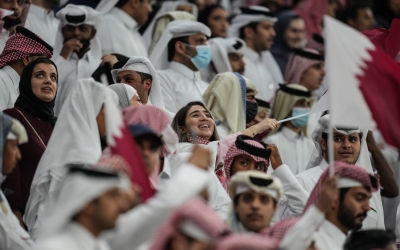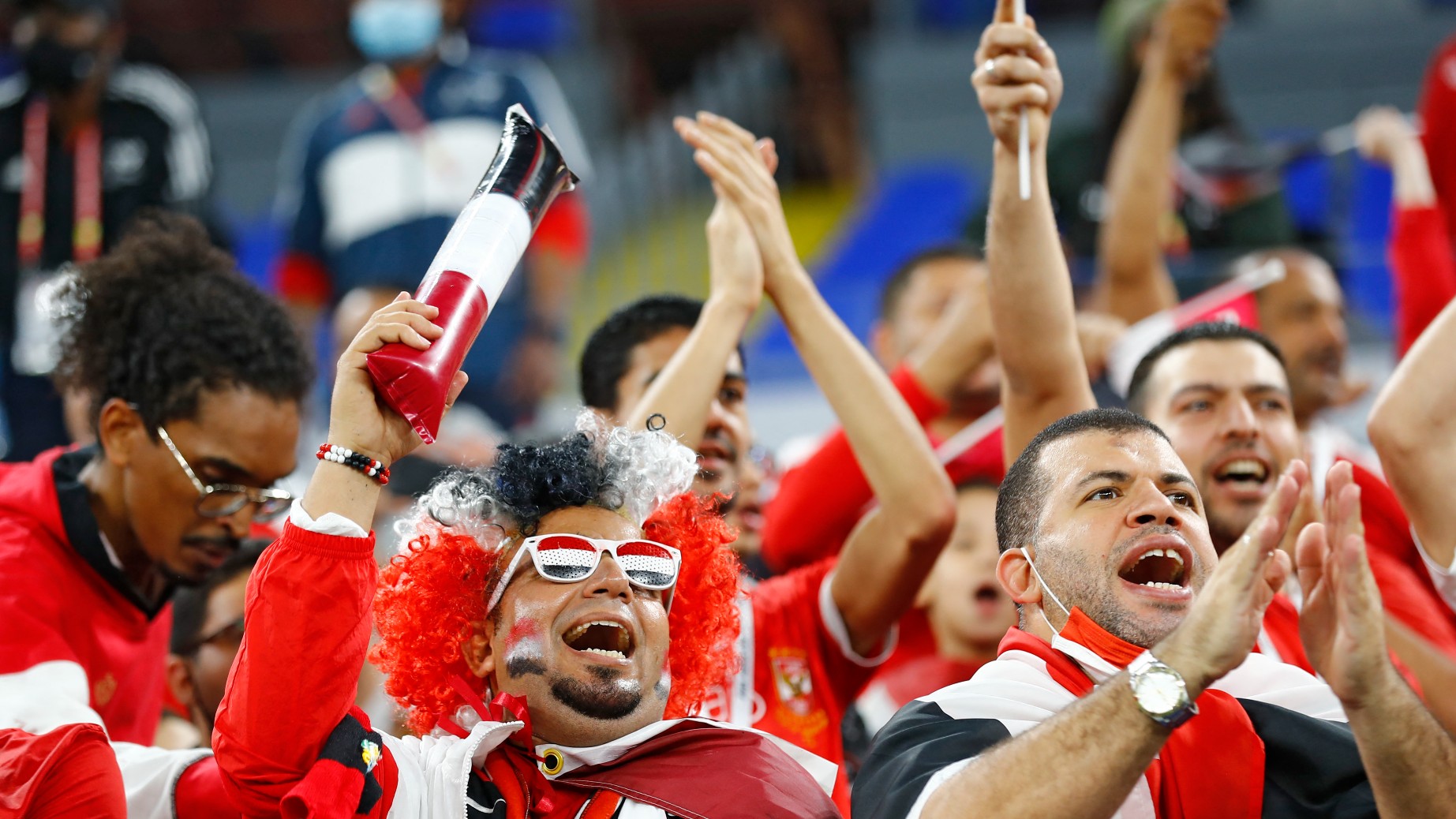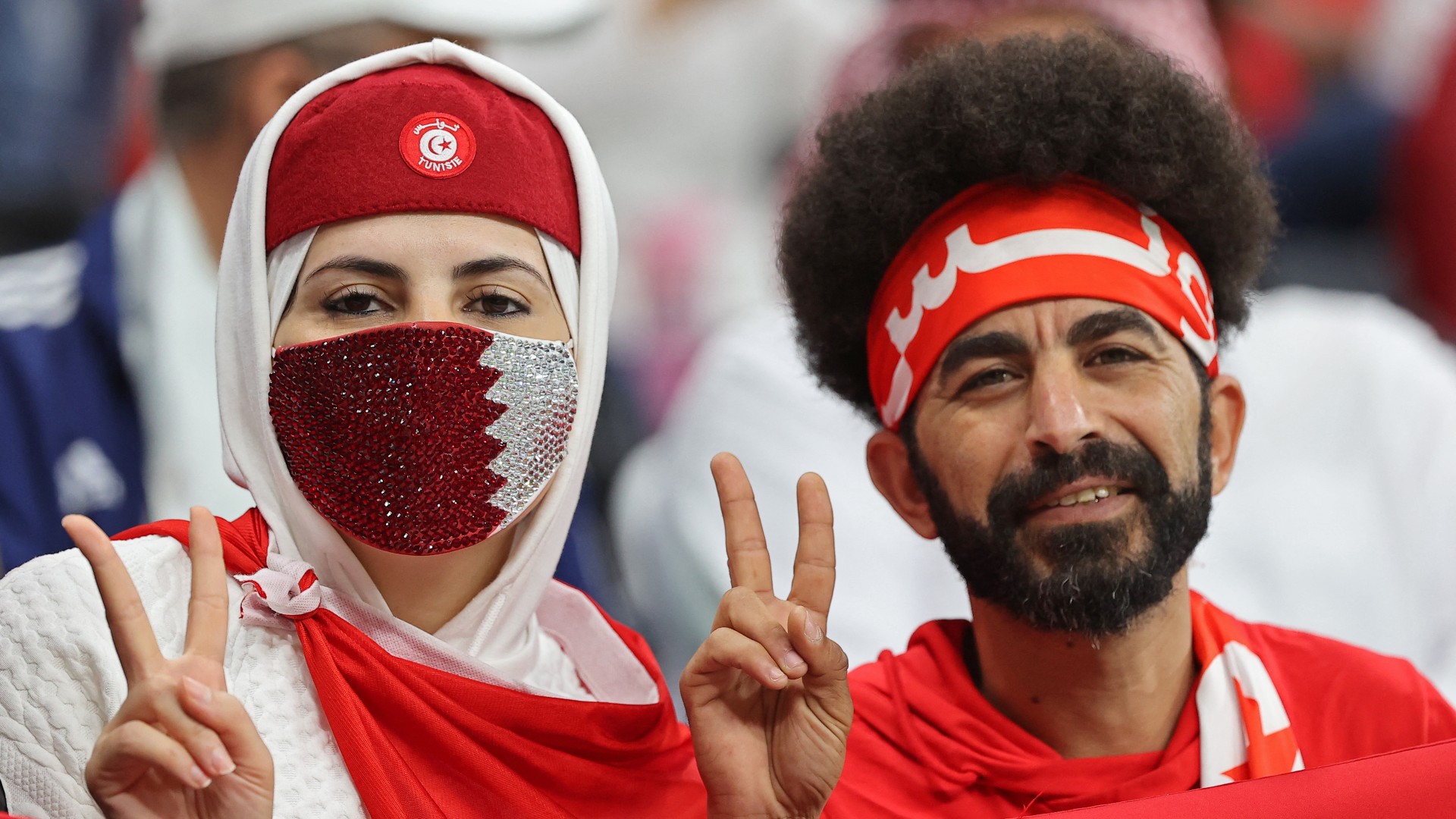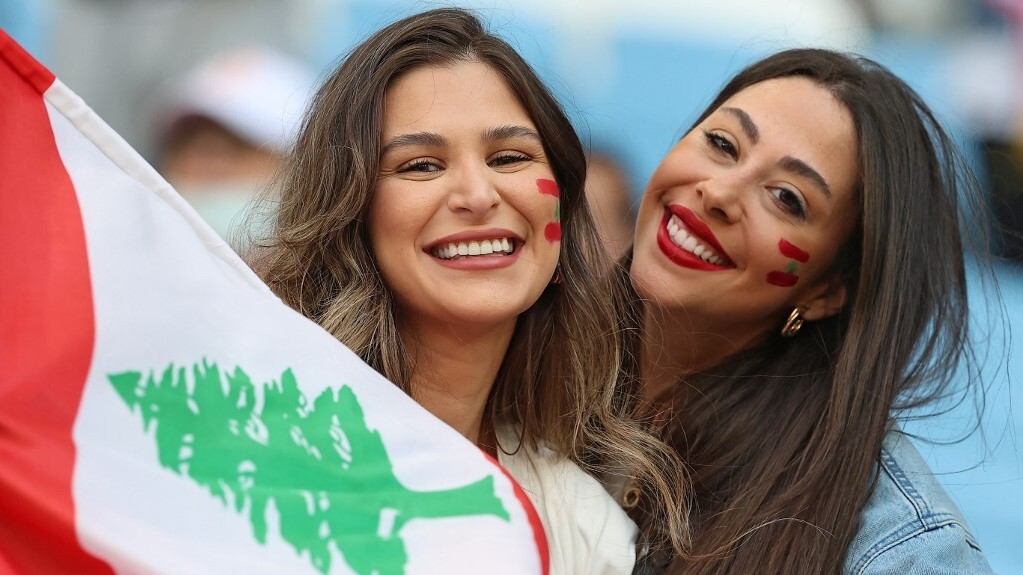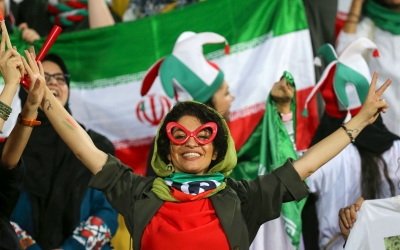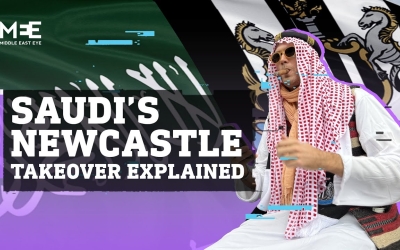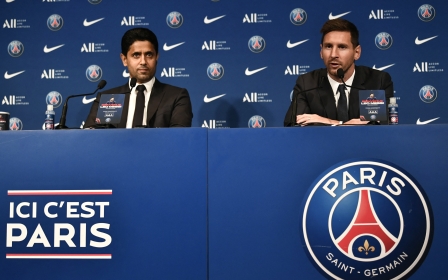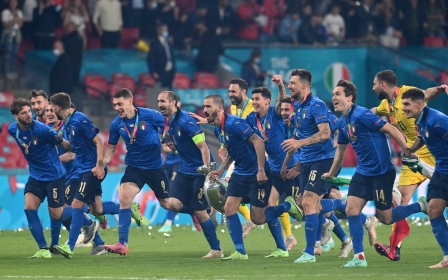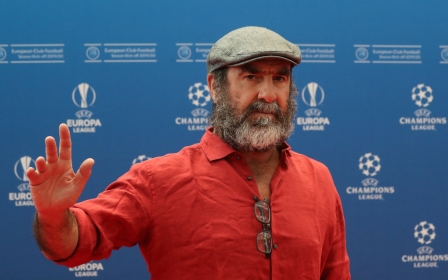Qatar World Cup 2022: How football became a game-changer for the Middle East
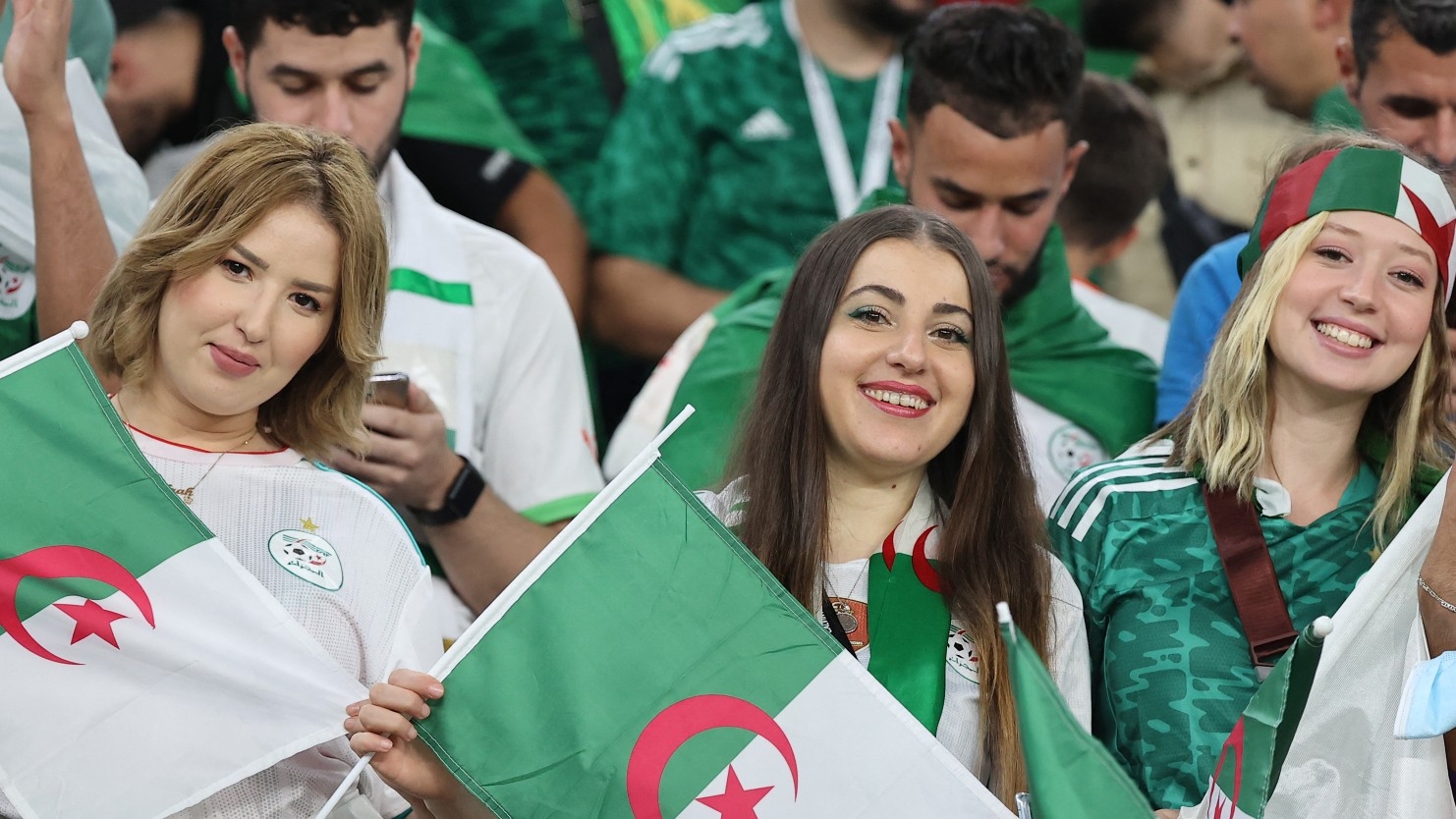
The headline story in world football this summer concerned young French phenomenon Kylian Mbappe's decision to sign a three-year contract extension with Paris Saint-Germain (PSG) at the expense of pursuing his lifelong dream move to Spanish giants Real Madrid.
PSG, which is owned by the state-funded Qatar Sports Investments (QSI), made the 23-year-old Mbappe the highest-paid footballer in the world, and even reportedly gave him a $125m signing bonus, a virtually unheard of fee for a team retaining its own player.
These stories showcase the ubiquitous place that football has come to hold in the Middle East and, in turn, the region’s impact on football globally
In a far less reported story, in late May the Argentine national football team cancelled a scheduled friendly match against Israel, responding to calls to pull out of the match by the Palestinian Al-Khader Football Club, whose 19-year-old player Mohammad Ali Ghoneim was shot dead by Israeli occupation forces in April.
Elsewhere in recent weeks, the Egyptian national football team found itself at the heart of a major regional crisis. Following its shocking 2-0 defeat to Ethiopia in the qualifiers for next year’s Africa Cup of Nations, emotions ran high as fans and political officials could not help but draw connections between the team’s performance on the pitch and Egypt’s ongoing feud with Ethiopia over its construction of the Grand Ethiopian Renaissance Dam, which Egyptians consider an existential threat to the country’s access to Nile waters.
In other news, Miguel Salgado, the 17-year-old son of former Real Madrid and Spain defender Michel Salgado, was recently called up to represent his country’s under-20 team - that country being the United Arab Emirates, where the elder Salgado has worked since retiring from football a decade ago.
New MEE newsletter: Jerusalem Dispatch
Sign up to get the latest insights and analysis on Israel-Palestine, alongside Turkey Unpacked and other MEE newsletters
Together, these stories showcase the ubiquitous place that football has come to hold in the Middle East and, in turn, the region’s impact on football globally. Football has long been the most popular sport in much of the Middle East, capturing the imagination of millions of people, channelling their aspirations, and uplifting legions of fans in the process.
Broader phenomena at work
More than a game, however, football has also emerged as a crucial marker of the levers of political and economic control, as well as an instrument in the hands of those who would challenge the reigning order.
Ever since Fifa shocked fans around the globe in 2010 by granting Qatar hosting rights for the 2022 World Cup, journalists, academics, activists, political leaders and lovers of the game the world over have clamoured to make sense of the decision and weigh the implications of a small Arab state serving as home to the most popular sporting event on the planet.
And while questions regarding labour rights, soft-power politics and the role of money in football have loomed over much of the conversation around the 2022 World Cup, others have seen how football offers a lens to identify broader phenomena at work in the region.
It is in that spirit that we approached our work on Football in the Middle East: State, Society, and the Beautiful Game, a new book in which 12 scholars offer insights into how football has become an arena of contest and dispute across a wide array of issues.
One of the first things that becomes apparent is that football’s legacy in the Middle East long predates the point at which it began to play host to a World Cup, or leverage unparalleled oil wealth in the European transfer market.
Indeed, European colonial officials introduced football to the region over a century ago, as part of efforts to cultivate “properly obedient individuals” out of colonised subjects.
In turn, nationalist struggles led by local elites incorporated a strong belief in organised sports as a marker of cultural and civilisational advance, with the creation of the Egyptian football league a case in point.
As the early iterations of storied football clubs as Al-Ahly and Zamalek demonstrate, the establishment of a national league created a new terrain on which questions of national identity, social class, economic mobility and the distribution of political power would play out.
Success and failure on the pitch would reflect fierce competition among nascent sporting institutions over access to resources, promising players and the hearts of Egyptian fans across the country.
Tense relations
It was no surprise, then, that in the aftermath of Gamal Abdel Nasser’s rise to power in a post-colonial Egypt, football yet again served as a site of political struggle, this time between Egyptian citizens and an emerging authoritarian regime that sought to control the lives of millions of passionate fans. As his popularity rose, Nasser was named honorary president of Al-Ahly, and proceeded to appoint a trusted military official to head the Egyptian Football Association.
Soon after, Nasser spearheaded the establishment of the Confederation of African Football in 1957, and inaugurated the Africa Cup of Nations at a time when Egypt was facing international isolation following its standoff with former colonial powers Britain and France. Egypt lifted the trophy in the first tournament, and to date has won more African cups (seven) than any other country.
In time, states would more frequently project their political agendas onto their national football teams. At the 1998 World Cup, a group stage match between Iran and the United States offered a stage upon which to play out years of hostility between the two nations, dating back to the 1979 Iranian revolution.
The build-up to the match, which Iran won 2-1 in dramatic fashion, featured intense media scrutiny and charged political sentiments expressed by fans on both sides, while the American and Iranian heads of state attempted to seize the moment to offer conciliatory gestures amid otherwise tense relations.
Incidentally, Iran and the US are set to meet in Qatar’s Al Thumama Stadium in another group stage showdown later this year. In the wake of an escalating regional rivalry and stalled attempts to restart the Iran nuclear deal, the match is sure to take on far greater meaning than the result on the field.
Popular mobilisation
Beyond attempts to prop up authoritarian rulers or challenge rival states, passion for football has also been invoked in the course of popular mobilisation.
During the 2011 Arab uprisings, football fan groups such as Al-Ahlawy Ultras in Cairo played an important role in the mass protests confronting the regime of Hosni Mubarak, bringing a wealth of experience in confronting security forces and challenging state power.
More recently, the Hirak protest movement in Algeria, which sought to prevent ailing dictator Abdelaziz Bouteflika from running for a fifth consecutive presidential term, incorporated in their anti-regime street protests the popular cheers, chaabi folk songs and tifo visual displays usually reserved for match days.
During the 2011 Arab uprisings, football fan groups such as Al-Ahlawy Ultras in Cairo played an important role in the mass protests confronting the regime of Hosni Mubarak
So too has the Boycott, Divestment, Sanctions (BDS) movement, launched by Palestinian civil society, seized upon football’s global appeal to call upon fans, clubs, national teams and their sponsors to observe the cultural boycott of Israel in response to its continued occupation of Palestinian land and human rights abuses against Palestinians.
Building upon the sports boycott targeting apartheid South Africa, the BDS movement has succeeded in highlighting the plight of Palestinians in part through campaigns such as the successful cancellation of the Argentina-Israel match and the call for teams and fans to boycott Puma until it ends its sponsorship of teams based in illegal Israeli settlements.
As several scholars argue in Football in the Middle East, observing elements of football’s role in society can offer a useful lens to examine deeper issues affecting populations, beyond players and fans.
Refugees who fled to neighbouring Lebanon following Israel’s forcible expulsion of hundreds of thousands of indigenous Palestinians in 1948 continue to live as stateless residents, denied many basic rights and access to dozens of specified professions.
Lebanon’s football league has institutionalised these discriminatory practices by placing quotas on the number of Palestinian players allowed at each club and even denying them the opportunity to play as goalkeepers.
Gender discrimination
Similarly, football can provide a means by which to both expose and challenge gender discrimination. In Turkey, for instance, the women’s game has been subject to unequal treatment, resulting in female footballers experiencing high wage disparities, inadequate medical care, limited access to facilities and greater career insecurity compared with male players.
In Iran, the ban on female fans in stadiums has been challenged not only by Fifa and international human rights organisations, but by the spectators themselves, in a series of tense confrontations.
Moreover, the lead-up to the 2022 World Cup has helped shed light on a number of issues of significance to the Gulf region in particular. The Qatar national team players who will participate in the tournament later this year include full Qatari citizens, long-term residents born in the country and naturalised citizens who came from elsewhere.
Nevertheless, be it in media interviews, social media posts or celebrations on the pitch, the performance of national identity by squad members often challenges preconceived notions concerning identity and citizenship in Gulf states.
On the question of migrant labour rights, preparations for the World Cup have exposed a global audience to the abuses inherent in the kafala system that governs labour relations in the Gulf.
As state authorities, global construction firms and recruitment agencies oversaw major projects, from stadiums and training facilities to hotels and a citywide metro system, an international pressure campaign urged Qatar to reform its labour practices.
The government announced a series of reforms in 2017, and the following year saw the International Labour Organization (ILO) open an office in Doha, where it has reported on changes to the conditions of migrant workers.
Rise of the Gulf states
The 2022 World Cup has come to symbolise the role that cash-rich states play by shifting the centre of gravity in world football. Indeed, the past two decades have witnessed significant transformations in the sport, with the increased globalisation and commodification of the game.
The 2008 purchase of Manchester City FC by an Emirati royal investment group, followed soon after by QSI’s acquisition of PSG, ushered in a new era of Gulf states becoming major players in Europe’s top leagues. Beyond the results on the field, these states have leveraged their prestigious holdings in the pursuit of soft power diplomacy and geopolitical interests.
In 2015, for instance, the Guardian reported that members of Man City’s front office had lobbied the British government to launch an investigation into the Muslim Brotherhood as an extension of the Emirati government’s region-wide crackdown against the movement. The recent acquisition of Newcastle United by the Saudi Public Investment Fund prompted allegations that the regime was engaged in sportswashing, particularly in light of its recent torrent of human rights abuses both at home and abroad.
Elsewhere, the war over football broadcasting rights took centre stage during the blockade of Qatar by a quartet of neighbouring countries that began in 2017. A pirate satellite signal based in Saudi Arabia called “beoutQ” operated for two years, undercutting the Qatari-run beIN Sports network, which holds broadcasting rights to the world’s most watched football competitions.
Looking ahead, the future of football in the Middle East is likely to be even more intertwined with the broader political, cultural and socioeconomic developments in the region. As the beautiful game’s reach expands ever further into society and becomes more deeply enmeshed within state and corporate interests, it is sure to raise new questions regarding consumerism and sustainability, national interests and labour rights, regime stability and political freedoms.
As the highs and lows of the game reverberate far beyond the field, it becomes clear to all that football is more than just a game.
The views expressed in this article belong to the author and do not necessarily reflect the editorial policy of Middle East Eye.
This article is available in French on Middle East Eye French edition.
Middle East Eye delivers independent and unrivalled coverage and analysis of the Middle East, North Africa and beyond. To learn more about republishing this content and the associated fees, please fill out this form. More about MEE can be found here.



